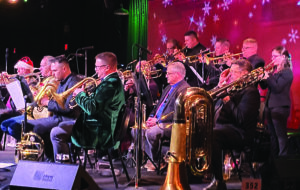Hoping it can do more than bullet-proof the City Council chambers, the Falls Church City Council adopted a “priority position” Monday night, voting unanimously to ask the State Legislature to pass a law empowering local jurisdictions to stiffen gun control. As the State Senate shifts to Democratic control in January, there is optimism that their wishes will be granted.
Current state law permits carrying firearms into local libraries, recreation centers and meeting halls, and the Council voted to urge changing that.
“The City supports changes to state law to allow local governments to create a weapons-free environment in publicly owned facilities,” the Council statement said, noting that the position is supported regionally and is consistent with legislation Fairfax County pursued last year.
What’s different in the coming Richmond legislative session commencing in January, however, is that the state senate will be under the control of Democrats for the first time in over a decade.
This means that the senate will be more sympathetic to petitions from the pro-Democratic City of Falls Church and other Northern Virginia jurisdictions. The Falls Church City Council’s “legislative agenda” is being forwarded to its state legislators, State Sen. Mary Margaret Whipple and State Del. Jim Scott.
While some Democrats have sided with the National Rifle Association and other pro-gun groups to prevent gun restrictions in libraries and recreation centers, the tilt in the State Senate as the result of the Nov. 6 election could bring a favorable result to Falls Church’s request.
Even if the measure only passes the Senate, and fails in the House, some form of compromise would forward the City’s wishes and would likely be signed by Democratic Gov. Tim Kaine.
The wording of the Falls Church City Council’s adopted position reads as follows:
“In order to strengthen the public’s confidence in their security and safety in public facilities, the City of Falls Church supports state legislation to allow the City to adopt an ordinance prohibiting the possession of firearms into any City owned property of facility, including recreational facilities and libraries, City administrative offices and the meeting rooms where Council and other boards and commissions formally meet to conduct the City’s business. The City would accept exclusion for holders of a concealed weapon permit. In addition, the City opposes legislation that would make it easier to traffic in illegal weapons.”
A number of City Council members admitted to being “unnerved” when, in September 2004, three dozen members and supporters of Virginia pro-gun rights organizations appeared in Council chambers, most wearing handguns.
They showed up in force to protest a proposed new City administrative policy at the time calling on City employees to contact police whenever they discovered a person to be wearing a weapon.
The late Dan McKeever, city manager of Falls Church then, devised the policy to mitigate the impact of 15 pro-gun lobby laws that had been passed by the Republican-controlled Virginia state legislature the previous spring.
Among the strongest advocates of stiffer gun control, Falls Church Councilman David Snyder demonstrated his resolve to stand against the pro-gun demonstrators, saying, “There may be places where you need your guns, but let me assure you, Falls Church isn’t one of them.” Saying he supported McKeever’s move, he then stood up and said, “Here I stand and can do no other.”
Following the incident, steps were taken to make the semi-circular dais behind which the seven Council members sit bullet-proof.
With November’s election result, however, the Council may get even more protection.
Also Monday, Snyder called upon the City Attorney to draft an “amicus brief” from the City to support the District of Columbia’s defense of its control laws as that case goes before the U.S. Supreme Court. Snyder agreed with fellow Councilman Dan Maller that such a brief should appeal to the Supreme Court, in the event it overturns the D.C. law, to spell out how communities can legally secure their safety against the proliferation of guns and the sharp rise in the number of fatalities suffered by public safety officers across the U.S. in the past year.













